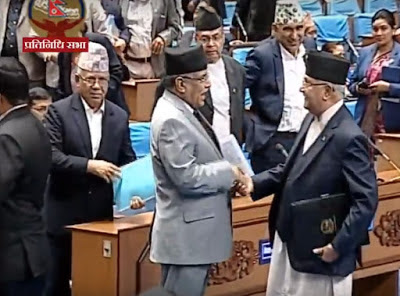We are permitted to anticipate enough good sense from the rival factions of the ruling Nepal Communist Party (NCP) to step back from the brink. But we are also prudent enough to face the inevitable.
The unification of the predominant Marxist-Leninist and Maoist factions of Nepal’s heavily splintered communist movement was artificial enough from the outset to expose its underlying unviability. If anything has been a surprise, it is that the NCP could maintain the subterfuge this long.
So, in that sense, another patch-up would only presage greater subsequent calamity. The NCP is top-heavy with bruised egos, burning ambitions and broad-spectrum bitterness to maintain the fiction of unity any longer. Allowing the party to split and politics to take its logical course may be the more judicious course.
There are apprehensions that a full-blown political crisis could sweep away the system. Such fears are not misplaced. In fact, they may be prescient enough. The ground has shifted significantly since the 12-Point Agreement was signed in India in late 2005, laying the foundations of the existing order.
The context should be more instructive for our purposes today. The Seven Party Alliance against the palace and the Maoist rebels reached the agreement on Indian soil at a time when a beleaguered royalist government’s assiduousness in breaking free from what it considered Indian duplicity morphed into a direct challenge to Indian and American regional interests in the so-called global war on terror.
Moreover, the reality that Washington and New Delhi were busy redefining their strategic relationship through a civil nuclear agreement under an Indian coalition government comprising a feisty communist partner served to facilitate a tacit and imprecise arrangement on Nepal.
China, exasperated by the royal government’s inability to stabilize the situation, recognized the perils of prolonged instability in Nepal to Tibet amid the Olympic Games it was organizing. Irrespective of how significant Chinese support for the royal regime was in the beginning, Beijing began making not-so-quiet noises about how the palace was exaggerating the extent of the backing.
That was music to Indian and American ears. New Delhi, Washington and Beijing came to a quiet understanding in early 2006 that would facilitate the implementation of the 12 Point Agreement. Still, they somehow seemed to let events on the ground define the specifics.
The outsized benefits China managed to reap in Nepal early on – without any investment, in New Delhi and Washington’s view – might not have been such a source of extreme consternation if geopolitics could stand still. As the three principal external stakeholders sought to stabilize their triangle amid newer entanglements, Nepali leaders enjoyed a wide berth to redefine the peace process by manufacturing more grievances than the people could sustain.
Today, each of the three external protagonists has recognized the futility of that accord in the changed circumstances. Our political class, meanwhile, has played the part so long that it has started to believe it has been in full control from the start.
Beijing has become a political intermediary in the ruling party’s affairs at a time when Washington and New Delhi are wariest of the mandarins in recent memory. The Nepali Congress is anxious for legislative endorsement of the US Millennium Challenge Corporation Compact as if those paltry billions stood between the nation’s life and death.
The government chose a time and manner to step up its claim to Indian-held territories and build massive national consensus wherein New Delhi has shed all qualms to dismiss an acknowledged bilateral dispute as a Chinese-instigated ploy. We have affirmed those territories in our coat of arms listed in an annex of a Constitution which, by most accounts, is gasping for breath.
Prime Minister K.P. Sharma Oli need not have squandered words on something so patently obvious as a concerted Indian campaign against his government in the aftermath of constitutional endorsement of Nepal’s new political map. His principal NCP rival Pushpa Kamal Dahal was even less warranted in having engaged in a such a discreditable attempt to shield New Delhi from growing demands for the prime minister’s resignation.
The unfortunate and even counterintuitive chain of events and analyses the two men have precipitated has tainted the political process amid a palpable but imprecise realignment of geopolitical equations.
Unfortunate as this confluence of internal and international dynamics is, we should not miss the bright spot. No new slogan, agenda or campaign can entice us into another nebulous promise of newness that fizzles into detriment and disappointment.
All forces across our political spectrum have been tried and tested for their purported decency and depravity. Now that Nepalis have recognized the expanse between those two extremes, we must learn to make do with what we have. Friends can be better friends – but they will never be one of us. As for enemies, we better start looking harder within and without.
Originally posted on Saturday, July 4, 2020
